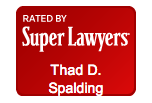
Mailing address:
P.O. Box 224626
Dallas, Texas 75222
Physical address:
2223 W. Jefferson Blvd.
Dallas, Texas 75208
214.946.8000 phone
214.946.8433 fax
Thad D. Spalding, Partner
Biography
Prior to joining the firm, Thad D. Spalding was a member of the appellate sections of San Antonio firms Ball & Weed, P.C., and Prichard, Hawkins, McFarland & Young, LLP. Thad and his family moved to Dallas in 2001 where Thad helped start Hermes Sargent Bates, LLP’s appellate section. In 2010, Thad joined The Law Offices of Marc H. Richman, where he continued to handle appeals and litigation support, along with a trial docket of complex personal injury, commercial, and family law cases.
Throughout his career, Thad has served as lead counsel on numerous appeals, has successfully argued cases before many of the intermediate courts of appeals, the Texas Supreme Court, and the Fifth Circuit Court of Appeals, and has assisted trial counsel by briefing and arguing complex motions for summary judgment, jurisdictional objections, expert witness challenges, jury charges, and post-trial motions throughout Texas in both state and federal courts.
Thad has been Board Certified in Civil Appellate Law by the Texas Board of Legal Specialization since 1999, and, from 2002-2020, was an active member of the State Bar of Texas Committee on Pattern Jury Charges – General Negligence and Intentional Personal Torts. He was recognized by Thomson Reuters in Texas Monthly as a “Texas Rising Star” in 2004 and then a “Super Lawyer” from 2004-2008 and again from 2014-2022, by ALM and Law.com in 2012 as a Texas “Top Rated Lawyer” in the Appellate category, and by D Magazine as a “Best Lawyer in Dallas” in the Appellate category from 2011-2014, 2016, 2018 and again in 2020. Thad is also rated AV Preeminent, the highest possible rating in both legal ability and ethical standards, by Martindale-Hubbell.
Thad is licensed to practice law in Texas, New Mexico, and Oregon.
= read publication
Publications & Presentations
Effective Use of Appellate Counsel on Your Trial Team
State Bar of Texas, Texas Bar College Summer School, Video Webcast, September 11, 2024
Valdez v. State Farm-A Case Study: Proving and Recovering Attorney’s Fees in a UIM Case
San Antonio Trial Lawyers Association, San Antonio, TX, June 20, 2024
An Expert Angle on Exemplary Damages
Texas Trial Lawyers Association, 2024 Midyear Conference and CLE Seminar, Austin, TX, June 13-14, 2024
Moderator, Juries & Courtrooms in Today’s Legal Environment
co-author(s): with Magistrate Judge Nicole Mitchell, Judge Jennifer Edgeworth, and Judge Brian GaryDr. Kenneth Street Law Symposium, Austin College, February 23, 2023
New Year? New Discovery Rules!
State Bar of Texas CLE, Texas Supreme Court: History & Current Practice (April 14, 2021)
New Year, New Rules: Review of Amended Discovery Rules
San Antonio Trial Lawyers Association Zoom CLE (March 18, 2021)
New Texas Discovery Rules-Are You Ready?
Texas Paralegal Journal, Vol. 26, No. 3 (Winter 2021)
New Year, New Rules: Review of the Amended Discovery Rules
Dallas Trial Lawyers Association, January 14, 2021
Panel Discussion – New Discovery Rules
co-author(s): with Kirsten Castaneda and Andy JonesDallas Young Lawyers Association, January 13, 2021
Punitive Damages: A waste of time? Or a means to an end?
Texas Trial Lawyers Association Midyear-Virtual Conference, May 14, 2020
Let the Jury Charge be Your Guide
TTLA Car Wrecks Seminar 2018
Punitive Damages
State Bar of Texas CLE, Advanced Personal Injury Law Course 2017
Preservation of Error
TTLA Trial Advocacy College of Texas (April 15, 2016)
Let the Jury Charge be Your Guide
TTLA Car Wrecks Seminar 2015
The Review of New Trial Orders on Appeal
Vol. 40, No. 5, Dallas Bar Association: Headnotes (May 2015)
Emerging Appellate Issues
co-author(s): with Justices Ada Brown, David Evans, and Jim Moseley (Ret.)Dallas Bar Association’s Bench Bar Conference, Horseshoe Bay, Texas (October 23, 2014)
Preparing, Presenting & Preserving Error in the Jury Charge
TTLA Car Wrecks CLE (October 9, 2014)
Exemplary Damages
State Bar of Texas CLE, Advanced Personal Injury Law Course 2014, Dallas, San Antonio, and Houston (July-August, 2014)
Default Judgments: Texas Supreme Court Decisions to Consider
Vol. 39, No. 2 Dallas Bar Association: Headnotes (February 1, 2014)
Ring in 2014 with a New Subrogation World Order
co-author(s): and Ben K. DuBoseVol. 38, No. 11 Dallas Bar Association: Headnotes (November 1, 2013)
What Every Young Lawyer Should Know About Legal Writing
co-author(s): with Justice Mary Murphy and Talmage BostonDallas Association of Young Lawyers (March 10, 2010)
Jury Charge – New Developments in the Texas Pattern Jury Charges
In-House CLE, Hermes Sargent Bates, LLP (January 14, 2009)
Jury Selection – Commitment Questions, Rehabilitation and Allocation of Peremptory Strikes
In-House CLE, Hermes Sargent Bates, LLP (October 23, 2008)
Products Liability in Texas
America First Insurance Company (June 30, 2007)
The Benefits of Retaining Appellate Counsel Throughout Litigation
South Plains Trial Lawyers Association (April 19, 2006)
The Benefits of Retaining Appellate Counsel Throughout Litigation
Denton Trial Lawyers Association (February 16, 2006)
The Benefits of Retaining Appellate Counsel Throughout Litigation
San Antonio Trial Lawyers Association (November 17, 2005)
2003 Texas Legislative Update
Hermes Sargent Bates, LLP (Fall 2003)
Contribution and Responsible Third Party Practice:Before and After July 1, 2003
In-House CLE, Hermes Sargent Bates, LLP (June 25, 2003)
Handling the Jury Charge & Jury Charge Objections
Appellate Section Luncheon Seminar, San Antonio Bar Association (May 1, 2001)
Post-Trial Motions
Appellate Law in the New Millennium Seminar, San Antonio Bar Association Appellate Practice Section and St. Mary’s Law Journal (March 1, 1999)
Annual Survey of Tort and Insurance Law
American Bar Association Tort and Insurance Law Journal (1996-1997)
= read opinion
Significant Cases
Byrd v. Cornelius, 52 F.4th 265 (5th Cir. 2022)
Successfully convinced court of appeals to dismiss officers’ qualified immunity appeal for lack of jurisdiction in light of material factual disputes regarding the officers’ use of force. The Fifth Circuit determined that video of the incident did not conclusively establish reasonable force, and that the law clearly established that officers’ use of force was excessive force in circumstances consistent with the Plaintiff’s version of events.
Crane v. City of Arlington, Tex., 50 F.4th 453 (5th Cir. 2022), cert. denied sub nom. City of Arlington v. Crane, 144 S. Ct. 342 (2023)and cert. denied sub nom. Roper v. Crane, 144 S. Ct. 342 (2023)
Successfully reversed trial court’s grant of summary judgment to police officer, holding that the officer was not entitled to summary judgment on his qualified immunity defense when he shot and killed an unarmed driver during a pretextual traffic stop.
Edwards v. Oliver, 31 F.4th 925 (5th Cir. 2022)
Dismissing police officer’s interlocutory appeal of qualified immunity defense in case in which Balch Springs police officer, Roy Oliver, fired into a car of teenagers leaving a party, killing Jordan Edwards. The Fifth Circuit found that it had no jurisdiction to review the district court’s denial of summary judgment because of material fact disputes regarding whether the vehicle was a threat at the time that Oliver shot into the car.
Painter v. Amerimex Drilling I, Ltd., 632 S.W.3d 156 (Tex. App.—El Paso 2021, no pet.)
Successfully convinced court of appeals that summary judgment based on the Workers’ Compensation Act’s exclusive remedy provision was not proper where fact issues existed as to whether killed and injured passengers’ travel from drilling site to bunkhouse originated in or related to Amerimex’s business.
Nettles v. GTECH Corp., 603 S.W.3d 63 (Tex. 2020)
Reversing plea to the jurisdiction and affirming the denial of an identical plea in another case, filed by GTECH, a private contractor hired to provide instant ticket manufacturing and services to the Texas Lottery Commission. Following its prior opinion in Brown & Gay Eng’g, Inc. v. Olivares, 461 S.W.3d 117 (Tex. 2015), the Court determined that because GTECH had discretion with regard to game design, and the Lottery Commission did not control the manner in which that work was performed, GTECH was not entitled to immunity.
Pennington v. Fields, No. 05-19-00149-CV, 2020 WL 2611251 (Tex. App.—Dallas May 22, 2020, pet. denied) (mem. op.)
Successfully reversed summary judgment in majority shareholders’ favor and rendered summary judgment in favor of minority owner in a closely -held corporation, holding that Retiring Shareholder provision of Cross Purchase Agreement required remaining shareholders to purchase retiring shareholder’s shares. In doing so, Court of Appeals rejected majority shareholders’ arguments that (1) provision created only an option, but not an obligation, to purchase retiring shareholder’s shares and (2) that minority shareholder was not a “retiring” shareholder because majority shareholders terminated his employment with the closely-held corporation and minority shareholder had taken employment elsewhere.
Poledore v. Daniel, No. 05-18-01278-CV, 2020 WL 1685333 (Tex. App.—Dallas April 7, 2020, no pet. h.) (mem. op.)
Successfully defeated appeal by client’s incarcerated ex-husband who complained about the notice given him of a bench trial on his partition suit, and who complained about a motion for continuance of that trial so that the ex-husband could conduct more discovery. The court of appeals determined that the ex-husband was provided adequate notice and opportunity to appear at his trial, and that the ex-husband’s motion did not warrant a continuance of trial.
Lane v. Manfre, No. 05-18-01305-CV, 2020 WL 104625 (Tex. App.—Dallas Jan. 9, 2020, pet. denied) (mem. op.)
Affirmed summary judgment in favor of ex-husband on ex-wife’s assault claims based on prior settlement agreement that includes those same claims as part of parties’ divorce.
In the Interest of C.E.C., a minor child, No. 05-17-01482-CV, 2018 WL 3062454 (Tex. App.—Dallas June 21, 2018, no pet.) (mem. op.)
Successfully upholding judgment, under a clear and convincing evidence standard, terminating parental rights and imposing permanent injunction against a father convicted of child pornography, and placing the child with her grandparents.
State of Texas v. T.S.N., 547 S.W.3d 617 (Tex. 2018)
In a case of first impression, the Texas Supreme Court affirmed the right of a person who is wrongfully accused and later acquitted of a crime to have the records related to that arrest expunged—even though the person was also arrested on an unrelated offense, to which she pled guilty. In affirming the opinion of the Dallas Court of Appeals, the Texas Supreme Court rejected the State’s “arrest based” interpretation, expressly disagreeing with numerous courts of appeals that had adopted this same interpretation. Instead, the Texas Supreme Court concluded that the statute’s plain language is not arrest-based and therefore does not prohibit the expunction of records related to an acquitted offense, even where the arrest includes another, unrelated offense.
McCain v. Promise House, Inc., No. 05-16-00714-CV, 2018 WL 2042009 (Tex. App.—Dallas May 2, 2018, no pet.) (mem. op.)
Successfully reversed summary judgment in favor of insured and insurer after defense counsel assigned by insurer agreed to settlement of claims but insured withdrew consent, where insurance policy was a non-consent policy which gave insurer unilateral right to settle case and insured no right to consent or, in this case, withdraw consent.
BoRain Capital, LLC v. Hashmi, 533 S.W.3d 32 (Tex. App.—San Antonio 2017, pet. denied)
Successfully challenged trial court’s grant of judgment notwithstanding a verdict following a jury trial in which the jury determined there to be no contract between BoRain and Hashmi. The court of appeals found that the trial court erred in granting judgment notwithstanding the verdict, reversed the trial court’s judgment, and rendered judgment that Hashmi take nothing.
Autosource Dallas, LLC v. Addison Aeronautics, LLC, No. 05-16-00838-CV, 2017 WL 2492787 (Tex. App.—Dallas June 9, 2017, no pet.) (mem. op.)
Successfully defended summary judgment in favor of landlord for unpaid rent by commercial tenant who terminated lease early, but failed to pay full amount of rent owed. Tenant argued that landlord did not sufficiently mitigate its damages by giving new tenant first two months free, and therefore was not required to pay rent it owed for those months. The Dallas Court of Appeals rejected this argument.
State v. T.S.N., 523 S.W.3d 171 (Tex. App.—Dallas 2017), aff’d, 547 S.W.3d 617 (Tex. 2018)
In a case of first impression, the court of appeals affirmed an order granting the expunction of records relating to an arrest for felony aggravated assault for which T.S.N. was subsequently acquitted. The State, claiming that the entire expunction statute is “arrest based,” argued that the records could not be expunged because, when T.S.N. was arrested, she was also arrested on a totally unrelated misdemeanor theft charge to which she ultimately pled guilty. The court of appeals rejected this “arrest-based” interpretation, concluding that, based on the plain language of article 55.01(a)(1) of the Code of Criminal Procedure, a guilty plea to a wholly unrelated offense does not prohibit the expunction of records related to the acquitted offense, even where the arrest arises out of both.
In the Interest of P.M.K., No. 05-15-01181-CV, 2017 WL 462343 (Tex. App.—Dallas Jan. 30, 2017, no pet.)(mem. op.)
Successfully defended Texas and Louisiana courts’ determination that, while Texas court had jurisdiction as the child’s “home state” under the Uniform Child Custody Jurisdiction and Enforcement Act, Louisiana court was the more convenient forum and therefore could exercise jurisdiction over child custody determination.
Hornbuckle v. Keller Williams Realty, No. 02-15-00398-CV, 2016 WL 7405807 (Tex. App.—Fort Worth Dec. 22, 2016, no pet. h.) (mem. op.)
Dismissing appeal pursuant to vexatious litigant statute, where Hornbuckle repeatedly filed lawsuits contesting the foreclosure on a specific piece of real property in Arlington, Texas, including this case. The court of appeals concluded that the trial court’s dismissal of the underlying lawsuit was proper, and dismissal of Hornbuckle’s appeal was proper pursuant to Texas Civil Practice and Remedies Code Ch. 11.
Young v. Pulte Homes of Tex., L.P., No. 02-14-00224-CV, 2016 WL 4491517 (Tex. App.—Fort Worth Aug. 26, 2016, no pet.) (mem. op.)
In a personal injury case arising out of faulty construction of family’s new home, the court of appeals reversed the trial court’s judgment which dismissed the parents’ claims for failing to disclose the claims in bankruptcy. The court of appeals also reversed the trial court’s award of sanctions under the DTPA, finding that the children’s DTPA claims were not groundless.
Premier Pools Mgmt. Co. v. Premier Pools, Inc., No. 05-14-01388-CV, 2016 WL 4258830 (Tex. App.—Dallas Aug. 12, 2016, pet. denied) (mem. op.)
In common law trademark case, upholding jury’s findings of secondary meaning, trademark infringement, trademark dilution, and unfair competition, and award of lost profits, disgorged profits, and permanent injunctive relief.
Luig v. North Bay Enters., Inc., 817 F.3d 901 (5th Cir. 2016).
In a breach of contract case arising out of the sale of a helicopter, the Fifth Circuit vacated the District Court’s sua sponte grant of summary judgment against the buyer on a notice of revocation/rejection of acceptance issue never raised by the seller, finding that the District Court abused its discretion by not considering the evidence of rejection or revocation presented by the buyer in its Rule 59(e) motion.
Blaylock v. Holland, No. 05-13-01197-CV, 2014 WL 3736210 (Tex. App.— Dallas July 14, 2014, no pet.) (mem. op.)
Reversing a trial court’s refusal to award clients trial court costs following successful appeal of adverse judgment.
In re H.E. Trans, No. 05-14-00340-CV, 2014 WL 2937497 (Tex. App.–Dallas June 26, 2014, orig. proceeding) (mem. op.)
Denial of petition for mandamus when the defendant challenged the trail court’s new trial order entered after the defendant asked the trial court to impose constitutional due process limitations to a punitive damages award.
CKH Family Ltd. P’ship v. MGD/CCP Acquisition, LLC, No. 05-12-00573-CV, 2013 WL 5614304 (Tex. App.—Dallas Oct. 14, 2013, no pet.) (mem. op.)
Successfully defended order dismissing claims based on parties’ contractual forum selection clause.
Richardson v. Richardson, No. 05-12-01123-CV, 2013 WL 3326870 (Tex. App.— Dallas June 27, 2013, no pet.) (mem. op.)
Successfully defended judgment appointing client as sole managing conservator of his children following week-long child custody jury trial.
Blaylock v. Holland, 396 S.W.3d 720 (Tex. App.— Dallas 2013, no pet.)
Reversing a trial court’s award of a homeowner’s property to his neighbor by adverse possession, holding that neighbor’s assumption that homeowner’s property was part of neighbor’s backyard, and neighbor’s use of that property as part of her backyard, was legally insufficient to support the trial court’s award by adverse possession.
Plano Parkway Office Condominiums v. Beaver Properties, 246 S.W.3d 188 (Tex. App.—Dallas 2007, pet. denied)
Reversing a summary judgment in a case of first impression involving the interpretation of the Texas Condominium Act.
Williams v. Dallas County, No. 05-06-01142-CV, 2007 WL 3121670 (Tex. App.—Dallas Oct. 26, 2007, no pet.) (mem. op.)
Successfully reversed summary judgment granted in favor of self-insured workers’ compensation carrier on the issue of the claimant’s “follow-on” injury
Perez v. Kleinart, 211 S.W.3d 468 (Tex. App.—Corpus Christi 2006, no pet.)
Reversing a defense verdict in a personal injury case and remanding for a new trial.
Ex parte M.R.R., 223 S.W.3d 499 (Tex. App.—Amarillo 2006, pet. dism’d)
Successfully affirmed judgment of expunction by defeating State’s argument that statutory limitation period does not apply to misdemeanor arrests
Redland Ins. Co. v. Southwest Stainless, L.P., 181 S.W.3d 509 (Tex. App.—Fort Worth 2005, no pet.)
Upheld judgment against surety on payment bond where surety complained of technical notice given to general contractor
Gibson v. Ellis, 126 S.W.3d 324 (Tex. App.—Dallas 2004, no pet.)
Upheld jury verdict in favor of defendant attorney in legal malpractice case, including award of sanctions in favor of defendant attorney
Ter-Vartanyan v. R&R Freight, Inc., 111 S.W.3d 779 (Tex. App.—Dallas 2003, pet. denied)
Upholding admissibility of expert reconstruction testimony of investigating officer


